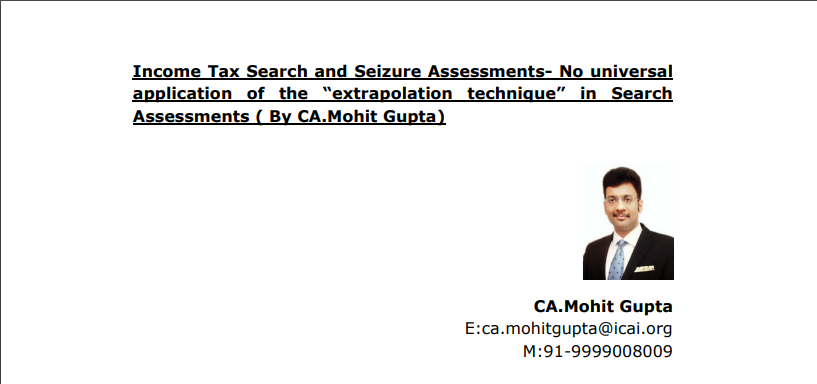Income Tax Search and Seizure Assessments- No universal application of the “extrapolation technique” in Search Assessments
Income Tax Search and Seizure Assessments- No universal application of the “extrapolation technique” in Search Assessments
Introduction:
During the course of a Search and Seizure action, it is seen in practice that incriminating material in the form of documents, diaries and other evidences are found which sometime reflects undisclosed income of an assessee only for a particular limited period of time and not for all the assessment years to be covered u/s 153A of the Income Tax Act’1961. However, it is seen that the during the course of search assessments, the finding of such undisclosed for a particular period is extrapolated to the entire block period of assessments as envisaged u/s 153A of the Income Tax Act’1961.
To illustrate, let us assume that during the search and seizure action on an assessee into manufacturing activity, certain seized document suggest that there were undisclosed scrap sales for 2 months only. The vital question here is as to whether the Assessing Officer while framing assessments u/s 153A r.w.s. 143(3) for 7 years, can extrapolate the findings of undisclosed income which relate to only 2 months, to entire 7 years.
On a similar note, in the case of search or survey on real estate developers, there may be cases when evidences are found regarding receipt of unaccounted cash or ‘on money’ from the customers. Such evidences may be found relating to certain units out of total project or from some of the customers. Whether in such cases, can the Assessing Officer extrapolate receipt of ‘on money’ to the entire project with respect to all the customers on the pretext that in case ‘on money’ is being received in certain cases, it reflects that the actual market price is higher and therefore the presumption is that ‘on money’ has been received from all the customers.
First of all let us understand what an “extrapolation” is.
The Extrapolation technique is the method of backward and forward projection of income while assessing the income of whole of the assessment years covered u/s 153A of the Income Tax Act’1961 on the basis of the income found to have been earned by the assessee for a short period. Under this technique, if the assessee is found to have earned the income found as a result of search based on certain evidence for a period of, say, 10 days, the assessee can be said to have earned the same income for the whole of the year or may be for all the years covered under assessment.
Having said so, it is pertinent to mention at the outset that it is a matter of settled legal principle that the doctrine of res judicata does not apply to tax laws so far as under the Income Tax Act each year is an independent year and the assessment is to be made for each year independently based upon the evidences available for that particular year.
However it is seen in practice that the department invariably relies on the extrapolation technique during the course of the search assessments and thereby makes arbitrary additions in the years relating to which no incrimination material has been unearthed on the pretext of some incriminating material pertaining only to a limited period/year.
Judicial Precedents:
To support its stand, the department heavily relies on the decision of the Supreme Court in the case of CST v. H.M. Esufali H.M. Abdulali [1973] 90 ITR 271 to justify the income estimated by it. In the above case, which pertains to sales tax law, the dealer had disputed the determination of turnover arrived at by the STO. On the basis of incriminating documents found at the premises of the dealer during the course of survey, while arriving at the best judgment assessment and estimating the assessee’s turnover, the STO observed that there were dealings outside the assessee’s books of account amounting to Rs. 31,171.28 during the period of 19 days. The fact of suppressed sale was established and the STO estimated the assessee’s turnover for the whole of the year on that basis. The assessee conceded that those bills belonged to him and the entries therein related to his dealings. The Supreme Court observed that it was proved and admitted that the assessee was dealing outside the accounts during the period of 19 days and that his dealings outside the books during that period stood at the value of Rs. 31,171.28 and that from this, it was open to the STO to infer that the appellant was dealing outside his books of account. The Supreme Court upheld the estimate of turnover made by the STO for the whole year. However, while upholding the estimate, the Supreme Court had made a qualification to the effect that the estimate should not be arbitrary and should have a nexus with the facts which had been discovered. It was stated that the basis adopted should be relevant to the estimate made. It was also stated by the Court that the assessing authority, while making a best judgment assessment, no doubt, should arrive at its conclusion on a rational basis without any bias and should not be vindictive or capricious. The prime issue before the Supreme Court while deciding the matter was whether estimate made in the best judgment assessment based on proper facts and material could be challenged just because of the fact that a precise estimate has not been made. Where it is purely a question of making estimate, it has been held by Supreme Court, that the estimate of the Assessing Officer should not be disturbed, provided it is fair and bona fide.
The Hon’ble Punjab and Haryana High Court in case of Tara Singh V ITO [2017] 81 taxman 293 (Punjab & Haryana) held that the assessing officer in a best judgment assessment can resort to a bona fide estimate based on a rational basis.
The Hon’ble Mumbai ITAT in case of ACIT V Giriraj Developers[2017] 82 taxman 54 (Mumbai – Trib.)
Facts:-
During the course of survey upon the assessee-firm one document was found with regard to sale of a shop involving cash component. The assessee had sold 5 shops during the year and on the basis of document impounded during the course of survey it was held by the Assessing Officer that during the year under consideration the assessee had also received cash on sale of said shops and brought to tax the same as undisclosed income of the assessee.
Held:-
The law clearly stipulated and put the burden upon the shoulders of the assessee to show that other shops did not have a cash component at all or the sales consideration of the remaining shops having identical location and other contribution was equivalent to their agreement value only. Nothing had been brought during the course of assessment proceedings in this regard by the assessee. The Assessing Officer also failed in bringing any further information or evidence on record in this regard. In the circumstances, the issue was restored back to the file of the Assessing Officer to give the assessee an opportunity to bring requisite evidences to show that market value of those shops were equivalent to the amount on which transactions had been done.
Read & Download the full Copy in pdf:
If you already have a premium membership, Sign In.
 CA Mohit Gupta
CA Mohit Gupta
Delhi, India
Mr. Mohit Gupta is a Fellow Member of the Institute of Chartered Accountants of India, a commerce graduate from prestigious Ramjas College, Delhi University, and alumni of St. Xavier’s School, New Delhi. He is practicing as a Chartered Accountant for more than 15 years and managing the Direct Tax Advisory and Litigation practice of M/s. Dhanesh Gupta & Co., Chartered Accountants, New Delhi a renowned Chartered Accountancy firm in the core domain of direct taxation established in 1978. He forte is handing Income Tax Search and Seizure matters, matters before the Income Tax Settlement Commission and other direct tax litigation matters. As of today, he has wide experience in handling Income Tax Search and Seizure Cases, representing matters before the Income Tax Settlement Commission, ITAT, and other appellate tribunals. He has been contributing articles in various professional magazines/journals and addressing various seminars on topics relating to Income Tax Search and Seizure, Income Tax Settlement Commission, and other allied tax matters. He has to his credit plethora of well-researched articles out of which many have appeared in leading journals. In Addition to the above, Mr. Mohit Gupta is a Special Auditor of the Income Tax Department and has carried out numerous Special Audits across the country on being appointed by the Income Tax Department which have plugged tax evasions, tax base erosion, and other tax manipulative practices and in turn, facilitated the Income Tax Department to collect huge tax revenues. Mr. Mohit Gupta has also been appointed as Special Auditor under other tax statutes and by other Investigation Agencies of the Government of India. Mr. Mohit Gupta, authored the periodical Newsletter on Income Tax Search and Seizure. The said newsletter contained well-researched write-ups/articles and judicial developments on the matters of Direct Taxation. The newsletter was circulated both electronically and otherwise. Recently, in the year 2016, Mr. Mohit Gupta has authored two comprehensive books on the Income Declaration Scheme’2016, titled as “Law Relating to Income Declaration Scheme’2016”. His books provided at one place the entire gamut of the Law relating the Income Declaration Scheme ‘2016 and set to rest all the queries that arose before, during, and after the course of making the declaration under the Income Declaration Scheme’2016. The books received an extremely overwhelming response from the readers including the proposed taxpayers, tax administration, tax professionals, corporate houses, and academicians. The said books were released by erstwhile Hon’ble Union Finance Minister, Shri. Arun Jaitley, Shri.Arjun Ram Meghwal, Minister of State for Finance and the Chairman of Central Board of Direct Taxes and many other dignitaries. Due to his continuous desire to always rise on the learning curve, he always has a quest and quenches to read more, learn more, and perform even more.













